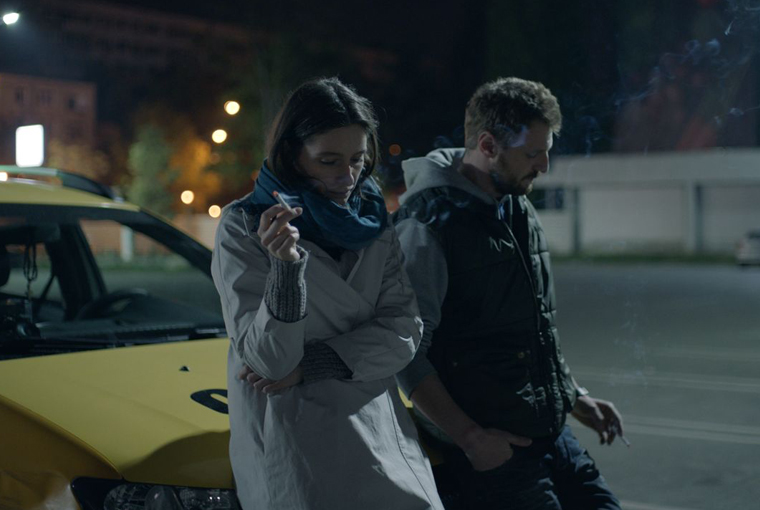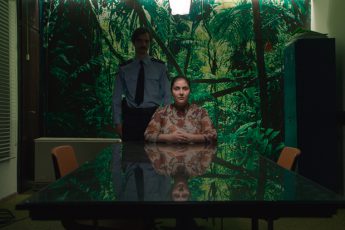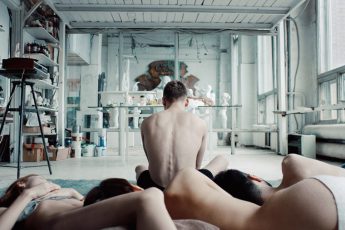
Spanning the course of a day and a night in Bucharest, Monsters depicts a crisis point in a relationship between a young, seemingly well-to-do couple. Using a three-part structure, the narrative first follows Dana (Judith State) on her return home for a business trip, then rewinds to reveal what Arthur (Cristian Popa) got up to during her absence, before continuing with the two of them together as they reflect on the future of their conjugal life together.
Skipping over its triteness, the first issue with this approach is the inherent imbalance in the dramaturgy of the different sections. Dana’s narrative essentially serves as an extensive, drawn-out set up. After she arrives at the train station at night, she proceeds to cry in the bathroom before getting in a taxi. She is clearly hesitant, however, and changes her mind about which address to go to. Her phone keeps ringing but she refuses to answer. Finally, she bribes the taxi driver (Alexandru Potocean) to let her stay in the car until morning, although this plan is also foiled when her pregnant neighbor turns up and desperately needs to get to the hospital. There are also numerous red herrings thrown in for good measure, such as an ominous fight between a drunk girl and the taxi driver, and allusions to a mysterious smell of fried meat emanating from her bathroom.
In essence, the segment is dedicated to building up suspense. Dana refuses to answer any questions that would account for her behavior (“If I tell you now, what will we talk about later?”). Indeed, she talks very little in general, conforming to the current trend of trying to turn the trope of the silent woman into some kind of an archetype of stoic suffering and repression. The result of this, however, is that she comes off as having basically no character at all, which makes it very difficult to be invested in the great revelation of her relationship issues. Adding to this, the anonymous taxi driver appears much more intriguing by sheer juxtaposition, even though his own character offers little beyond a glimpse of yet another contemporary cliché – the gruff taxi driver with hidden depths forced into a second job by the poor state of society.
This makes the second section the pay-off. Jumping back in time, we are finally introduced to Dana’s husband Arthur as he furtively plans a date over text message. Just as it seems the film has gone in the most obvious direction – Dana is being troubled by straightforward infidelity – the big reveal comes. Arthur’s tryst is with a man, namely Alex (Șerban Pavlu), a blind date he met over Grindr. The scene of the encounter between them plays out in real time and is by far the best of the film. While the dialogue is too clunky and the exposition laid out too neatly, it nevertheless manages to capture the awkwardness and humor of nervous anticipation transformed into disappointing sex.
Although the discussion of homosexuality and the continued taboo surrounding it that takes place between the two men is fairly refreshing and sensitively handled, it nonetheless feels inherently problematic to use bisexuality as the punchline to the question of “what could possibly be so shocking?” The decision to treat the matter so superficially seems like a hugely wasted opportunity, especially given that it is easily the most interesting aspect of a film that otherwise simply rehashes tired themes.
Again, returning to the question of narrative weighting, it feels incredibly disproportionate to spend 45 minutes watching Dana drifting around the city being indecisive while Arthur gets all the action (even if he then also goes on to drift around the city for the rest of his story arc). Skipping ahead to the final part – signaled by a completely unnecessary shift in aspect ratio from 4:3 to 16:9 – we learn that Dana has apparently also been unfaithful to Arthur, but we are given no insight into her motivations, desires or conflicts. Her sexual transgression is confined to a throwaway line that comes across as a last-ditch attempt at restoring symmetry to the two protagonists that has little significance in and of itself.
As such, Monsters fails both as suspense-driven drama and as a meaningful exploration of morality and complexity in contemporary relationships. It also seems confused about the conclusion it wants to draw with this allegory. After the couple are reunited and decide to stay together despite their inability to conform to the societal conventions of monogamy, the film changes direction once again and launches into a debate about whether or not they should have children, which again ends in more sulking around the city. In choosing such a condemning name for the film, the expectations of scandal and provocation are set very high, while in reality what it delivers is a fuzzy portrait of two people struggling to reconcile romantic domesticity with sexual impulse. If this is what it takes to earn the label of monster, according to this film it seems like there is very little hope for humanity.




Leave a Comment